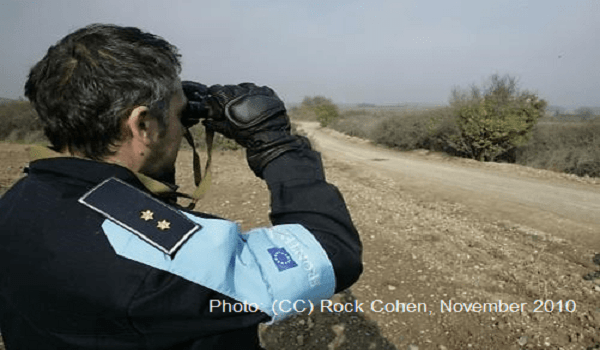Following months of controversy, scrutiny and complaints over the conduct of the European Border and Coast Guard Agency (Frontex), the European Ombudsman has opened another investigation, this time into access to information concerning the location of agency vessels on the Aegean Sea. Separately, NGOs are threatening legal action before the Court of Justice of the European Union (CJEU) if Frontex Executive Director, Fabrice Leggeri does not end the agency’s missions on the Aegean Sea.
European Ombudsman Emily O’Reilly has opened a new investigation into Frontex, based on a complaint by Spanish MEP Sira Rego, after the agency denied a request for information from Light House Reports concerning the positions of 16 vessels used in Frontex’s maritime operations on the Aegean. The journalists investigating Frontex involvement in pushback operations requested information from the agency in March 2020 based on suspicions of their Automatic Identification System (AIS) transponders being switched off during controversial operations making them impossible to track. In its initial response to an official request for information by Sira Rego from 16 November 2020, Frontex referred to a regulation guiding public access to European Parliament and Council and Commission documents, and denied access on the grounds that it involved sharing personal data and sensitive information and alleged risks of such information being used by human smugglers. Upon several additional requests by Sira Rego clarifying the lack of such a risk, the agency gave a second reply on 27 January 2021, stating that the required documents did not exist or were not accessible.
In a letter to Executive Director of Frontex, Fabrice Leggeri, the Legal Centre Lesvos and Front-Lex called for an immediate suspension or termination of the agency’s activities in the Aegean Sea. According to the organisations: “The request is based on an accumulation of evidence showing Frontex and its Executive Director have failed to act, in infringement of European Treaties, in relation to fundamental rights and international protection obligations in the Aegean Sea region…” Based on Greece’s violations of EU and international law including collective expulsions, so-called pushbacks, as well as Frontex complicity and failure to report, the organisations are ready to launch a case before CJEU.
Questioned about the many boats returning to Turkey after encountering the Greek coastguard in a recent interview, Leggeri, suggested that people crossing the Aegean are returning to Turkey voluntarily because they realise mid-way that they are not entitled to protection. Statistics reveal that a large majority of people applying for protection in Greece in the period between 1 January and 30 June 2020 and in recent years did in fact qualify for international protection.
For further information:
- ECRE, MEPs Vote for Respect for Human Rights at the EUs External Borders Amid Continued Revelations and Increased Scrutiny of Frontex, February 2021
- ECRE, Frontex: Critique and Scrutiny Continues, December 2020
Photo: (CC) Rock Cohen, November 2010
This article appeared in the ECRE Weekly Bulletin. You can subscribe to the Weekly Bulletin here.

